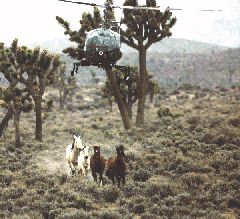|
There have been numerous rumors circulating, particularly among those recommending a beef boycott, that beef cattle organizations were among those that helped engineer Senator Conrad Burns' secret Rider #142. Printed below are two position statements that were published by the The National Cattlemen's Beef Association.
FL 3.1 2001 Wild Horses & Burros
WHEREAS, excessive numbers of feral horses and burros continue to cause increasing deterioration of range conditions in many areas of the West, and
WHEREAS, NCBA is concerned with the escalation in costs of the Wild Horse and Burro Program,
THEREFORE BE IT RESOLVED, that NCBA supports legislation that would provide for:
- Immediate identification of proper population levels where not currently identified, enforce currently permitted numbers, and engage in the management and removal of wild horses and burros, to levels that will allow the herd population not to exceed permitted numbers
- A re-opening of a period to allow ranchers to claim horses and burros not previously removed from federal and private lands.
- Authorization for sale (and immediate title transfer), or disposal, of unadopted horses and burros by the BLM/USFS with sales receipts to be used in the Wild Horse and Burro Program.
- A finding that permittee owners of state water Rights and related facilities, are not responsible for providing water for wild horses and burros without prior agreement and unless permittees are compensated for expenses incurred.
- A restriction of wild horse and burro Populations to lands occupied in 1971 when the Wild Horse and Burro Act was enacted.
BE IT FURTHER RESOLVED, the NCBA supports the recommendations of the Wild Horse and Burro Advisory Board and urges the Secretaries of Agriculture and Interior to immediately implement them.
BE IT FURTHER RESOLVED, that NCBA supports the non-profit North American Wild Horse and Range Systemís program for wild horse sanctuaries and other similar sanctuaries.
BE IT FURTHER RESOLVED, that the federal land management agencies should stand all costs of maintaining range improvements damaged by feral horses.
Omnibus Contains Many Wins for Ranchers, Westerners
Congress voted last night to send its completed Omnibus Appropriations bill to the Presidentís desk for signature. Many ranchers, especially those in the West, will benefit from some of the legislative measures contained in the bill.
Producer members of the Public Lands Council (PLC) and the National Cattlemenís Beef Association (NCBA) have supported the following provisions affecting livestock producers:
- NEPA Relief for Grazing Permits: Some ranchers grazing livestock on public lands will get relief from the current administrative backlog disrupting the cycle of grazing permits renewal. Congress authorized the Forest Service to issue up to 900 grazing permits under a categorical exclusion pursuant to the National Environmental Policy. Permits contained under the categorical exclusion must be able to document improvements in their land and resource management plans.
- Sale Authority for Wild Horses and Burros: This provision will aid in the management of the wild horses and burros. This will better protect the health and well-being of wild horses and burros, as well as improve forage resources and lands where ranchers graze livestock. Congress amended the Wild Horse and Burro Act to require the sale of wild horses and burros that are more than 10 years of age or have been offered unsuccessfully for adoption at least three times. All qualifying animals must be offered for sale until the appropriate management level is attained in all areas occupied by wild horse and burros. Funds generated from the sale of the animals must be used for the costs relating to the adoption of horse and burros, including the costs of marketing adoptions.
- Sage Grouse Habitat Funding: Congress approved a $5 million earmark out of the Farm Bill Wildlife Habitat Incentives Program for sage grouse conservation projects on public and private lands in western United States. U.S. Fish and Wildlife biologists recommended last week that listing the bird under the federal Endangered Species Act was not warranted. Listing the bird would have caused ranchers to face increased costs, regulatory delays and land use restrictions that could seriously impact their operations.
"Our members have been working with Congress for some time to secure relief in these areas,"says Jeff Eisenberg, director of federal lands for NCBA and executive director of PLC. "These measures will provide our producers with a more sustainable working environment, while providing the necessary protections for wildlife and the environment."
The Grazing Permit Renewal provision, for example, will prevent interruption of grazing permits while federal agencies struggle to meet environmental documentation obligations. "This will assure some ranchers can maintain their grazing operations without interruption for paperwork delays," says Eisenberg.
The contents of these position statements can be authenticated at the NCBA's Government Affairs web site at the following addresses:
| 
